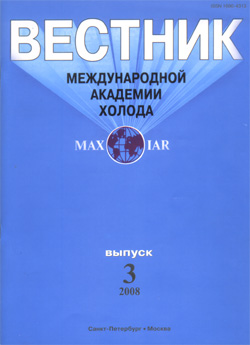
Methodology for comparing the thermodynamic cycle efficiency in refrigerating and heat pump systems

Annotation
Presently there are a number of various approaches to the analysis of working substance efficiency in refrigerating and heat pump units. Their choice is often complicated by numerous requirements, such as fire and explosion safety, low ODP, compliance of production and operation processes with environmental and medical criteria, thermal and corrosion resistance, and price for the substance itself. However, thermodynamic efficiency will always stand out among these specifications. The technique proposed makes it possible to quickly assess the efficiency of a large number of pure substances and mixtures for refrigerating and heat pump units. It is based on the equality of temperature drops between the heat carrier and working substance in the evaporator and condenser with rigorously fixed parameters of heat carriers in heat exchangers. This technique has been used to calculate and compare thermodynamic efficiency values for the cycles involving a wide diversity of pure working substances and mixtures it refrigerating units.
Keywords
Постоянный URL
Articles in current issue
- World tendencies and priorities in development of low-temperature engineering
- Use of effective radiation in the refrigerating system of an open-air ice skating rink
- Second virial coefficient of methane
- Nitrogen cold supply system with a vortex tube for a tunnel fast-freezing unit
- Concerning proper formulation of the problem of fluid flow in a pipe
- Asymmetric scaling equation of state for the R23 refrigerant
- Researching operation modes of a cryogenic fish freezer
- Nanostructures based on magnesium silicide as effective materials for thermoelectric energy conversion
- Efficiency of spray cooling towers
- Choosing the pattern of whole body cryotherapy
- Dielectric permittivity of ammonia used as a working substance of refrigerating plants
- Calculation of capillary tubes using dimensionless equations
- Nonlinear thermoelectric phenomena
- Production of pure industrial gases by air separators in piston compressors modernized by BARRENS for the work without cylinder oiling
- Identifying effective thermal and hydrodynamic properties of heterogeneous porous and biomaterials by means of fragmentation analysi
- Dynamic methods for studying water-containing materials
